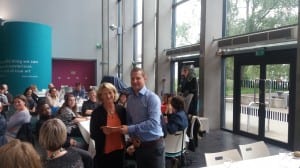Just attending the announcement…more to follow soon.

This blog has evolved from a book of the same name. Rurality is interpreted in many ways depending on individual encounters with rural space and this leads to different ways of conceiving the social and economic challenges that rural communities face. The blog represents the personal views of Professor Gary Bosworth, who is a Visiting Professor of Rural Entrepreneurship in Lincoln International Business School and Professor of Entrepreneurship at Northumbria University.
An interesting article featuring research from Polly Chapman and Brian Weaver – 2 of our Rural Entrepreneurship Conference presenters:
This week we heard MP’s demanding that BT Openreach “gets it house in order”. http://www.bbc.co.uk/news/business-36832505 While this now has the attention of the national stage, these criticisms are nothing new, and the slow provision of broadband services to rural areas is not a uniquely British problem either.
Research I have done with Koen Salemink and Dirk Strijker at the University of Groningen in the Netherlands, has shown that national providers continue to service urban areas with faster internet connections while leaving more peripheral regions poorly served.
There is a clear paradox where the more peripheral regions that are arguably most in need of improved digital connectivity are the very regions which are the least well connected. Faster broadband connectivity or “Next Generation Access” may not be a public service itself, but many other public services – for example healthcare, internet banking, and e-Government – are dependent upon reliable internet with sufficient bandwidths and speeds.
Broadband internet is increasingly viewed as a utility, but the provision of better internet services has been strongly linked with regional economic growth. However, unlike other utilities that have been state-provided and subsequently privatised, BT Openreach’s project is being rolled out through complicated mechanisms where private firms compete for state-sponsored contracts.
This free market rationale where competition forms the basis for improving digital connectivity leaves some people excluded because they are deemed too costly to serve in relation to the income that would be generated. In the Netherlands, this situation has been exacerbated in scenarios where the larger villages are served early on and as a result, the remaining outlying villages and hamlets become even less attractive to commercial providers who cannot generate the necessary economies of scale.
Where less attractive rural areas are deemed unprofitable for smaller providers, the largest national providers like Openreach acquire an effective monopoly.
Only when local communities take action and try to work with smaller partners to deliver innovative solutions does realistic competition arise. New research at the community level has identified a number of local broadband initiatives which demonstrate that communities with the right blend of skills and enthusiasm can create their own solutions. Our research has found that this type of activism can have the effect of signalling to larger market players like Openreach, or KPN in the Netherlands, that they must act if they wish to retain their monopoly. Promises of lower cost “universal” provision can thwart local initiatives, but even then they can still take many months to come to fruition.
Moving forwards, we need to recognise that there is an increasing array of technologies that can provide access to broadband and which could reach the so-called last five per cent. These will vary according to both the topography and the make-up of local populations.
With a large share of this unserved five per cent in rural areas, we are already seeing some rural businesses being forced to relocate to keep up with their competitors. Combined with the quality of broadband provision being increasingly factored into house prices, the risks of economic decline in these rural areas are very real – but seemingly permissible because of percentage-based coverage targets that leave pockets of exclusion.
This “rural penalty” was first noted by Edward Malecki in 2003 in the USA, but despite champions of internet investment claiming that this can eradicate the costs of distance, the full potential for ICT to boost rural economies has not yet been realised.


Thanks to everyone who participated in a very enjoyable conference in Lincoln. The quality of papers was very strong and I should especially congratulate Ron Methorst from the Netherlands on winning the best PhD Paper prize and Lavinia Wilson-Youlden on winning the overall best paper prize. As a result of the event, we hope to take some of the inspiring stories of community-based entrepreneurship, innovative rural business development and farm diversification to create a showcase to illustrate the massive potential within our rural communities.
To show our commitment to the local rural economy, we also arranged for a special beer to provided by a local start-up microbrewery in Lincolnshire.

The perspective of an “out” voter who seeks positive change for the future
In all of the concerns about Brexit, let’s remember that there has been substantial opposition to the EU for a long time. The founding nations continue to dominate, new nations are allowed in to benefit the EU (even if convergence criteria are not properly met) and struggling economies are propped up to maintain trade and stability for the core nations, not out of a genuine belief on European solidarity.
Most of all, we see politicians disengaged from citizens – where were the messages about what the EU delivers during the campaign to balance the easy criticisms of cost and regulation? Perhaps it is because the Commission is not accountable to an electorate and because those within the system are quite content with their lifestyles, expenses and belief in the EU project. From the outside, it appears that this collective belief leads EU representatives to deny or oppose rising Euroscpeticism instead of listening to criticisms.
Therefore, we are now at a moment in history where the next steps are vitally important. The UK needs leadership that is inclusive of many political views. The role of Scottish and Irish representatives will be especially important as the UK needs their voices to be heard in shaping the new political landscape. The Referendum was not a mandate for a “Brexit government” and to that end I have been very pleased to hear Boris Johnson re-stating his position that Britain must continue to be an important nation within the continent of Europe – just not one that approves of the EU Parliament and Commission in their current form.
I would not extend that inclusivity to Nigel Farage though. His gloating speech in the EU parliament was a national embarrassment. He won the platform to say something positive about the need for the EU to listen to the citizens and contemplate reform but his attitude overshadowed anything constructive that he might have intended. He has let down his own voters. Such attitudes are also fuelling a minority of xenophobic Brexit voters and I applaud everyone for standing up against any such intolerance or abuse – although I think it is worth pointing out that a “remain” vote could also have sparked similar reactions among some nationalist factions.
For UK politics, this vote has told us two things. Firstly, politicians should make these complex decisions and not rely on publicity campaigns (of dubious veracity on both sides) to influence an under-informed electorate to make historic decisions. Secondly, this is proof that a large swathe of the UK population has lost representation in Westminster as well as Brussels, and the referendum offered a 2-for-1 protest vote. Arguably, ever since Tony Blair courted middle England to win the election in 1997, traditional Labour voters have had nowhere to turn. In Scotland, the SNP have capitalised very effectively on this, as did the Liberal Democrats prior to the Coalition. And then UKIP’s win in the 2014 European elections still did nothing to change politics, only to deliver us a referendum that Westminster insiders were confident that they could “win” and the thus the whole issue could be swept under the carpet. The political elite must listen to these votes – it cannot be blamed on a handful of extremists but this is part of a longer term trend of dissatisfaction with politics today.